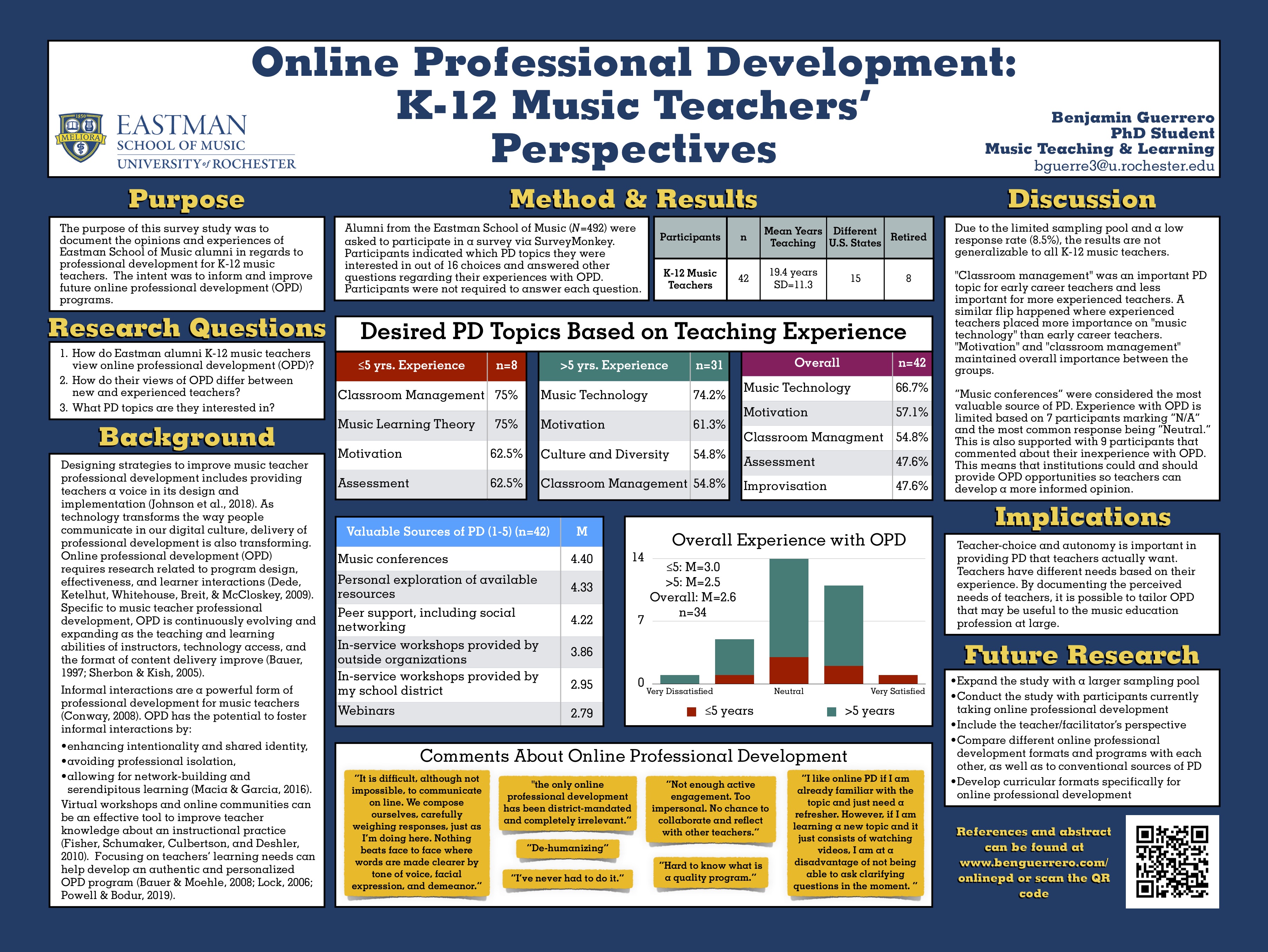
Abstract
To inform and improve future music teacher professional development, the purpose of this survey study is to document the opinions and experiences of K-12 music teachers regarding professional development, as well as their perceived professional development needs. Factors under investigation include teaching experience, topics of interest or areas of need, past experience with professional development, and current views of online professional development. Alumni from a major university that are current K-12 music teachers will be asked to participate in this survey. The researchers aim to provide insight on how the needs of experienced music teachers differ from newer teachers, which could help further the development of authentic and personalized online professional development programs.
Designing strategies to improve music teacher professional development starts with providing teachers a greater voice in its design and implementation. As technology transforms the way people communicate in our digital culture, so can the method of professional development delivery. Online professional development (OPD) is an area in need of research, specifically on program design, effectiveness, and learner interactions (Dede, Ketelhut, Whitehouse, Breit, & McCloskey, 2009). OPD for music teachers is not a new concept, but it is continuously evolving and expanding as the teaching and learning abilities of instructors, technology access, and the format of content delivery improve (Bauer, 1997; Sherbon & Kish, 2005).
Informal interactions have been found to be a powerful form of professional development for music teachers (Conway, 2008). OPD has the potential to foster social learning by enhancing intentionality and shared identity, avoiding professional isolation, and allowing for network-building and serendipitous learning (Macia & Garcia, 2016). Virtual workshops and online communities can be an effective tool to improve teacher knowledge about an instructional practice (Fisher, Schumaker, Culbertson, and Deshler, 2010). It is important to note that technology itself does not facilitate learning, but it is possible for OPD programs to use it in ways that are consistent with various learning frameworks (Vrasidas & Zembylas, 2004). Focusing on teachers’ learning needs can help develop an authentic and personalized OPD program (Bauer & Moehle, 2008; Lock, 2006; Powell & Bodur, 2019).
This study is the first step toward developing an OPD program from the ground up. In order to improve the current methods of OPD, which is sometimes merely a pre-recorded video webinar or an online message board, we must first understand what it is that music teachers value in professional development. Then, the next step is to use technology in a meaningful way to connect teachers with the community and facilitators that will be most helpful to them. The results of this process along the way could be beneficial to any music teacher or organization that is interested in improving OPD.
References:
Bauer, W. I. (1997). Using the internet for professional development. Music Educators Journal, 83(6), 22-27.
Bauer, W. I. & Moehle, M. (2008). A content analysis of the MENC discussion forums. Bulletin of the Council for Research in Music Education, 175, 71-84.
Conway, C. M. (2008). Experienced music teacher perceptions of professional development throughout their careers. Bulletin of the Council for Research in Music Education, 176, 7-18.
Dede, C., Ketelhut, D. J., Whitehouse, P., Breit, L., & McCloskey, E. M. (2009). A research agenda for online teacher professional development. Journal of Teacher Education, 60(1), 8-19.
Fisher, J., Schumaker, J., Culbertson, J., & Deshler, D. (2010). Effects of a computerized professional development program on teacher and student outcomes. Journal of Teacher Education, 61(4), 302-312.
Lock, J. V. (2006). A new image: Online communities to facilitate teacher professional development. Journal of Technology and Teacher Education, 14(4), 663-678.
Macia, M. & Garcia, I. (2016). Informal online communities and networks as a source of teacher professional development: A review. Teaching and Teacher Education, 55, 291-307.
Powell, C. & Bodur, Y. (2019). Teachers’ perceptions of an online professional development experience: Implications for a design and implementation framework. Teaching and Teacher Education, 77, 19-30.
Sherbon, J. W. & Kish, D. L. (2005). Distance learning and the music teacher. Music Educators Journal, 92(2), 36-41.
Vrasidas, C. & Zembylas, M. (2006). Online professional development: Lessons from the field. Education + Training, 46(6/7), 326-334.